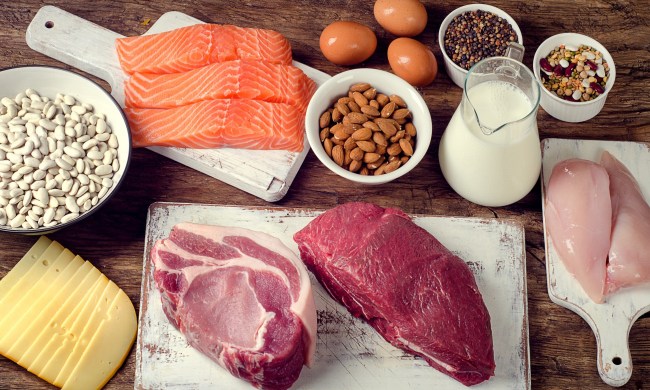
With each passing year, there seems to be a newly discovered or formulated supplement that is “deemed necessary” to add to your personal repertoire to provide vital health benefits. From vitamin D to probiotics, it can feel like you need a small pharmacy inside your home just to keep up with your daily supplement needs. Next thing you know, you’re popping fifty pills per day just to have your health potential maximized.
Collagen supplements are one of those said health supplements gaining traction in recent years, with purported benefits extending to everything from anti-aging skincare support to muscle building. But, do collagen supplements live up to the hype? What are the benefits of collagen supplements? Should you take one? We looked at all the research so we could answer these questions to help you make an informed decision about whether collagen supplements may improve your health. Keep reading to find out more if you should buy or sell on collagen supplements.
[lement.” width=”800″ height=”533″ />
What is collagen?
Collagen is the most abundant protein in the body, comprising about one-third of the body’s total protein composition. This versatile substance forms components of bones, teeth, skin, ligaments, tendons, muscles, blood vessels, and corneas, and plays an instrumental role in holding cells and tissues together.
Although there are over a dozen distinct types of collagen in the body, there are four abundant types. Over 90% of the collagen in the body is Type I. It is made of densely packed fibers and is present in harder structures like bones, teeth, tendons, and fibrous connective tissue. Type II collagen consists of loosely packed fibers and forms the elastic cartilage that cushions joints. Type III collagen primarily supports muscles, organs, and blood vessels, while Type IV collagen is involved in filtration in the skin.

Collagen benefits
There are quite a few evidence-backed benefits of collagen, though additional studies are still needed to fully confirm and elucidate the mechanisms behind these benefits. Commonly- cited benefits of collagen include:
- Increasing skin elasticity
- Reducing the appearance of fine lines and wrinkles
- Increasing skin turnover for more youthful-looking skin
- Increasing bone density
- Building muscle
- Improving gut health and digestion
- Reducing inflammation and joint pain

Should you take a collagen supplement?
Collagen is the most abundant protein in the body, but it is not classified as an essential nutrient. This means that the body is able to manufacture collagen internally; in other words, you don’t need to consume collagen to have collagen in your body. As long as you have a well-balanced diet with adequate protein intake, your body should be able to meet its collagen needs without the need for supplements. That said, there are some risk factors for low collagen levels. If any of these conditions apply to you, collagen supplements may be a good idea.
Collagen supplements may support collagen production for vegans and vegetarians
Your body naturally synthesizes collagen protein by combining the amino acids proline and glycine. Therefore, ensuring adequate intake of these amino acids will support endogenous collagen production. While there are plant-based sources of proline such as wheat germ and some vegetables like asparagus, the proline content is much higher in egg whites and dairy products. Moreover, glycine is particularly high in animal skin (chicken skin, pork skin) and gelatin. However, it is also present in most protein-rich foods. Vegans and vegetarians may be able to meet the needs of these amino acids through diet, but if not, collagen supplements can help.
Collagen supplements can be beneficial for older adults
The quantity and quality of collagen produced by the body declines significantly as we age. Moreover, the collagen we already have begins deteriorating throughout the body. This is one reason why skin turgor and elasticity declines, and we start getting more wrinkles. Sarcopenia, or the loss of muscle mass, is another manifestation of the reduction in collagen production. After the age of 30 to 40, taking a collagen supplement may help attenuate the decline in collagen production and quality in your body.
Collagen supplements may help those with dietary restrictions or limited diets
The synthesis reaction that combines proline and glycine to form collagen also requires vitamin C, zinc, and copper, so you need adequate micronutrient intake to support collagen production. Foods rich in vitamin C include bell peppers, dark berries, citrus fruits, kiwi, and cruciferous vegetables. Zinc is found in oysters and shellfish, seeds, some vegetables, and animal meats, while copper is present in legumes, seeds, organ meats, and cocoa.
Collagen supplements may be helpful for those with heavy sun exposure
UV rays from the sun create free radicals in the body, which can cause oxidative damage and denature collagen. Collagen supplements may help increase cellular repair and collagen turnover.
Collagen supplement may enhance hair and nail health
Hair and nails contain collagen, and some studies suggest that collagen supplements may help improve hair growth and strengthen the nails.
Collagen supplements may be helpful for smokers
While quitting smoking is ideal, since it’s associated with numerous diseases including cancer and high blood pressure, smokers may benefit from collagen supplements since smoking has been shown to inhibit the synthesis of Type I and Type II collagen.
Collagen supplements may be beneficial for those with poor diets
Diets high in refined carbohydrates, sugars, and alcohol have been shown to inhibit natural collagen production, so a collagen supplement may help. That said, try to gradually work toward adopting a healthier diet, such as the Mediterranean diet, focusing on whole, natural foods.
Collagen supplements may be necessary with certain autoimmune diseases
Lupus and other autoimmune diseases can cause the body to attack its own collagen. Speak to your physician to discuss whether collagen supplements may help.
Collagen supplements may help those with joint pain
Since collagen is a key component of cartilage (as mentioned above), which cushions your joints and helps them move smoothly, collagen supplements may help reduce joint pain and stiffness.
Collagen supplements may help those with osteoporosis
Though more research is necessary, collagen supplements may help increase bone density. If you have osteoporosis, you may consider discussing collagen supplements with your doctor.
With all the research and potential benefits that a high-quality collagen supplement can provide, it’s no wonder why it has been receiving so much hype as of late. If it helps make you look a little younger too, that’s a great little added bonus.



